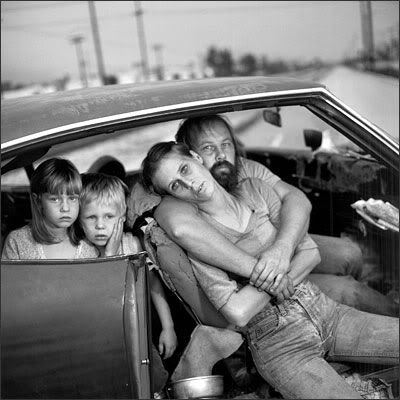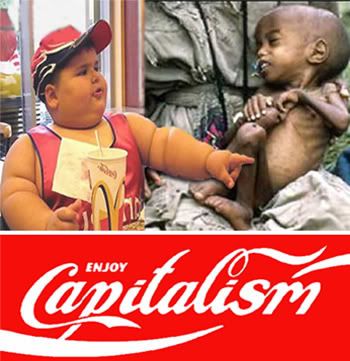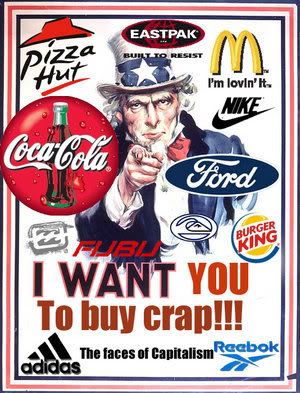CAPITALISM: DESTROY IT, BEFORE IT DESTROYS YOU NEXT
CAPITALISM:
DESTROY IT, BEFORE IT DESTROYS YOU NEXT

STOP following capitalism down its dead-end road.
You are MORE than a consumer.
You are MORE than a wage-slave.
A job does NOT define you.
A car is NOT a reflection of who you are.
Clothes do NOT make you.
Diamonds are NOT "best friends."
Your value does NOT depend on how much money you have.
YOU ARE A HUMAN BEING. AND THERE IS A BETTER WAY:
LIFE AFTER CAPITALISM.
International Monetary Fund (IMF)
Dominique Strauss-Kahn, Managing Director (October 11, 2008)
"Intensifying solvency concerns about a number of the largest US-based and European financial institutions have pushed the global financial system to the brink of systemic meltdown."

Capitalism Without Rules
by James Keye (October 11th, 2008)
"The appeal of capitalism exists largely in its making acceptable the concentration of wealth and in its religion-like faith in a common, generally negative human attribute as a positive guiding principle: human greed. Capitalism is a social and economic design that gives great freedom to the most greedy. Greed and wealth concentration are intellectually supported under the argument that the invisible hand of greed will design the best possible distribution of wealth based on the most efficient use of resources. And it denies that humans have the power, or should have the power, to control wealth and resources.
This leave it to the market argument overtly suggests that we should not trust other people to control the process of wealth distribution while hiding the fact that the very most acquisitive and ruthless of us are doing exactly that under the cover of the market. Trillions of dollars of wealth have been taken by the tax and credit system over the last 8 years (and for many years before) and redistributed to the economic elite, a polite term for the greedy sociopaths at the core of these economic actions. This is being done primarily with war, the healthcare (sic) system and the credit system.
The bailout of Wall Street is not a bailout at all. Embezzling is slow. To get big bucks in a hurry requires a robbery and a robbery requires the hold-up note. All the planning can be done in secret, but with a robbery there comes the moment when intentions must be made clear: Fill this bag. I have a gun in my pocket. We have just been through such a moment, with the note written in all capitalism, so most people missed its true meaning.
Fill this bag. If you dont your lives will be ruined and childrens lives will be ruined. In capitalism the note reads: The Market has been damaged by excessive attempts of foolish people to regulate it and so trillions of dollars must be given to the managers who are guided by the True Invisible Hand to save us from a great depression, social unrest and civil war.
What this boils down to is that capitalism, as an economic process, seeks to remove the rules that guide economic behavior, and as economic capitalism melds into political capitalism, what ever form of governance was in place is replaced with fascism."


Financial Tsunami: The End of the World as We Knew It
by F. William Engdahl (October 1, 2008)
"The Great Depression in Germany in 1931 began with a seemingly minor eventthe collapse of a bank in Vienna, Creditanstalt, that May. ...
Today, in 2008, some 77 years later, a German Finance Minister stands before the Bundestag announcing the end of that American Century. Today the German government encourages a fusion of Dresdner with Commerzbank. Today Deutsche Bank, which some years ago acquired Bankers Trust in New York in a merger wave, appears to be in a stronger position than its American counterparts as Wall Street investment banks, some more than 150 years old as the venerable Lehman Bros., simply vanish in a matter of days. The American financial Superpower crumbles before our eyes."


Beyond Capitalism to Post-Capitalism: Conceiving a Better Model of Wealth Acquisition to Supersede Capitalism
by Peter Baofu (June 30, 2005); Author link 2
"Contrary to conventional wisdom about capitalism, the pervasive norm to acquire wealth and the zealous mission to fight poverty have their double sides often unsaid, in that there is no wealth without poverty, just as there is no poverty without wealth, such that more wealth also creates more poverty.
Consider, for instance, America, which is regarded by many as the wealthiest country on Earth at the turn of the 21st century. Yet, this wealthiest country on Earth is also the most hated one around the world, as a soul-searching question after the September 11, 2001 terrorist attacks is, Why do they hate us so?
Isn't it paradoxical, Dr. Baofu asks, that this enormous accumulation of wealth ends up creating more hatred and violence around the world, instead of contributing to a more prosperous, humane one? Is there something fundamentally wrong in this seductive idea of wealth acquisition in capitalism?
The wealth paradox disappears, as Dr. Baofu goes to great length to explain, if it is understood that a civilization which prides itself on acquiring wealth as the central focus of life meaning is too inadequate to fulfill fully the domains of life on material, relational and spiritual concerns. It is so, since capitalism, as a historical contingency to fight the material impoverishment of pre-modernity, overdoes itself as a historical solution to the problem of poverty and will not last, to be superseded by what Dr. Baofu originally proposed as its successor, post-capitalism."

Why is Capitalism Failing Us?
by Doug Page (June 14th, 2008)
"Capitalism as it existed in the days of Adam Smith no longer exists in the Twenty First Century. Capitalism has mutated so as to cause the merger of corporate power with state power so that we now have corporate state capitalism whose powers are exercised solely to benefit of the global elite at the expense and starvation of the rest of us."

Rejoice: The Impending Collapse of Global Capitalism?
by Bill Hansen (October 01, 2008)
"Hang on to your hats, boys and girls, we might be in for one helluva ride.
Nearly two decades ago, in the aftermath of the much deserved implosion of Leninist communism in the then Soviet Bloc, there was nearly universal celebration in the West. We had won the Cold war: ideologically, economically and militarily. Hurrah!!!
The American philosopher, Francis Fukuyama, penned a triumphalist essay in the neo-con journal, The National Interest. He entitled it The End of History. The essay was later turned into a book and Fukuyama was hailed as the post-communist philosopher of the future for his encomium to liberal democracy and free market capitalism. The essence of Fukuyamas argument was that the end of the Soviet Union marked the end of any plausible challenges or alternatives to the hegemony and moral superiority of free market capitalism and liberal democracy. THERE WERE NO CONCEIVABLE HISTORICAL ALTERNATIVES. We had arrived at the end of history.
Historys aftermath hasnt lasted all that long. Long before Fukuyama, a far more prescient observer of the history of political economy asked the question: What is the modern state, but the executive committee of the bourgeoisie? As one watches modern capitalism cooperate with the modern state in extricating capitalism from its own excesses, one is reminded as to how extraordinarily correct Karl Marx was and remains."

Could Globalization Fail?
by Thomas Palley, YaleGlobal (April 13, 2006)
"Business has a private incentive to escape the system to countries with lower costs. Yet, it still needs mass consumption. The system needs a solid middle class, but is also driven to hollow out that middle class. This contradiction has been papered over by consumer borrowing provided by deregulated financial markets and a 25-year asset price boom. The problem is that such borrowing risks prove unsustainable if incomes are hollowed out, and that could stop the economic merry-go-round. If that stoppage produces an economic crash, globalization may crash, too."

Today's Capitalism Has Run Its Course
by Bashir Goth, PostGlobal (October 7, 2008)
"...it is vital that the current capitalism system should change course. Instead of propping up the pillars of an aging system, the world should come up with radical economic reforms based on holistic views and diversified structures instead of the current orthodox uniformity. ...The current man-made financial crisis heralds a new age for the capitalist system; it [signifies] a precipice of a great change. And it must be clear to all by now that any system that doesn't value the economic welfare of every individual and not only the wealthy few will be doomed to the same destiny."

International Monetary Fund (IMF)
Dominique Strauss-Kahn, Managing Director (October 11, 2008)
"Intensifying solvency concerns about a number of the largest US-based and European financial institutions have pushed the global financial system to the brink of systemic meltdown."

DESTROY IT, BEFORE IT DESTROYS YOU NEXT

STOP following capitalism down its dead-end road.
You are MORE than a consumer.
You are MORE than a wage-slave.
A job does NOT define you.
A car is NOT a reflection of who you are.
Clothes do NOT make you.
Diamonds are NOT "best friends."
Your value does NOT depend on how much money you have.
YOU ARE A HUMAN BEING. AND THERE IS A BETTER WAY:
LIFE AFTER CAPITALISM.
International Monetary Fund (IMF)
Dominique Strauss-Kahn, Managing Director (October 11, 2008)
"Intensifying solvency concerns about a number of the largest US-based and European financial institutions have pushed the global financial system to the brink of systemic meltdown."

Capitalism Without Rules
by James Keye (October 11th, 2008)
"The appeal of capitalism exists largely in its making acceptable the concentration of wealth and in its religion-like faith in a common, generally negative human attribute as a positive guiding principle: human greed. Capitalism is a social and economic design that gives great freedom to the most greedy. Greed and wealth concentration are intellectually supported under the argument that the invisible hand of greed will design the best possible distribution of wealth based on the most efficient use of resources. And it denies that humans have the power, or should have the power, to control wealth and resources.
This leave it to the market argument overtly suggests that we should not trust other people to control the process of wealth distribution while hiding the fact that the very most acquisitive and ruthless of us are doing exactly that under the cover of the market. Trillions of dollars of wealth have been taken by the tax and credit system over the last 8 years (and for many years before) and redistributed to the economic elite, a polite term for the greedy sociopaths at the core of these economic actions. This is being done primarily with war, the healthcare (sic) system and the credit system.
The bailout of Wall Street is not a bailout at all. Embezzling is slow. To get big bucks in a hurry requires a robbery and a robbery requires the hold-up note. All the planning can be done in secret, but with a robbery there comes the moment when intentions must be made clear: Fill this bag. I have a gun in my pocket. We have just been through such a moment, with the note written in all capitalism, so most people missed its true meaning.
Fill this bag. If you dont your lives will be ruined and childrens lives will be ruined. In capitalism the note reads: The Market has been damaged by excessive attempts of foolish people to regulate it and so trillions of dollars must be given to the managers who are guided by the True Invisible Hand to save us from a great depression, social unrest and civil war.
What this boils down to is that capitalism, as an economic process, seeks to remove the rules that guide economic behavior, and as economic capitalism melds into political capitalism, what ever form of governance was in place is replaced with fascism."


Financial Tsunami: The End of the World as We Knew It
by F. William Engdahl (October 1, 2008)
"The Great Depression in Germany in 1931 began with a seemingly minor eventthe collapse of a bank in Vienna, Creditanstalt, that May. ...
Today, in 2008, some 77 years later, a German Finance Minister stands before the Bundestag announcing the end of that American Century. Today the German government encourages a fusion of Dresdner with Commerzbank. Today Deutsche Bank, which some years ago acquired Bankers Trust in New York in a merger wave, appears to be in a stronger position than its American counterparts as Wall Street investment banks, some more than 150 years old as the venerable Lehman Bros., simply vanish in a matter of days. The American financial Superpower crumbles before our eyes."


Beyond Capitalism to Post-Capitalism: Conceiving a Better Model of Wealth Acquisition to Supersede Capitalism
by Peter Baofu (June 30, 2005); Author link 2
"Contrary to conventional wisdom about capitalism, the pervasive norm to acquire wealth and the zealous mission to fight poverty have their double sides often unsaid, in that there is no wealth without poverty, just as there is no poverty without wealth, such that more wealth also creates more poverty.
Consider, for instance, America, which is regarded by many as the wealthiest country on Earth at the turn of the 21st century. Yet, this wealthiest country on Earth is also the most hated one around the world, as a soul-searching question after the September 11, 2001 terrorist attacks is, Why do they hate us so?
Isn't it paradoxical, Dr. Baofu asks, that this enormous accumulation of wealth ends up creating more hatred and violence around the world, instead of contributing to a more prosperous, humane one? Is there something fundamentally wrong in this seductive idea of wealth acquisition in capitalism?
The wealth paradox disappears, as Dr. Baofu goes to great length to explain, if it is understood that a civilization which prides itself on acquiring wealth as the central focus of life meaning is too inadequate to fulfill fully the domains of life on material, relational and spiritual concerns. It is so, since capitalism, as a historical contingency to fight the material impoverishment of pre-modernity, overdoes itself as a historical solution to the problem of poverty and will not last, to be superseded by what Dr. Baofu originally proposed as its successor, post-capitalism."

Why is Capitalism Failing Us?
by Doug Page (June 14th, 2008)
"Capitalism as it existed in the days of Adam Smith no longer exists in the Twenty First Century. Capitalism has mutated so as to cause the merger of corporate power with state power so that we now have corporate state capitalism whose powers are exercised solely to benefit of the global elite at the expense and starvation of the rest of us."

Rejoice: The Impending Collapse of Global Capitalism?
by Bill Hansen (October 01, 2008)
"Hang on to your hats, boys and girls, we might be in for one helluva ride.
Nearly two decades ago, in the aftermath of the much deserved implosion of Leninist communism in the then Soviet Bloc, there was nearly universal celebration in the West. We had won the Cold war: ideologically, economically and militarily. Hurrah!!!
The American philosopher, Francis Fukuyama, penned a triumphalist essay in the neo-con journal, The National Interest. He entitled it The End of History. The essay was later turned into a book and Fukuyama was hailed as the post-communist philosopher of the future for his encomium to liberal democracy and free market capitalism. The essence of Fukuyamas argument was that the end of the Soviet Union marked the end of any plausible challenges or alternatives to the hegemony and moral superiority of free market capitalism and liberal democracy. THERE WERE NO CONCEIVABLE HISTORICAL ALTERNATIVES. We had arrived at the end of history.
Historys aftermath hasnt lasted all that long. Long before Fukuyama, a far more prescient observer of the history of political economy asked the question: What is the modern state, but the executive committee of the bourgeoisie? As one watches modern capitalism cooperate with the modern state in extricating capitalism from its own excesses, one is reminded as to how extraordinarily correct Karl Marx was and remains."

Could Globalization Fail?
by Thomas Palley, YaleGlobal (April 13, 2006)
"Business has a private incentive to escape the system to countries with lower costs. Yet, it still needs mass consumption. The system needs a solid middle class, but is also driven to hollow out that middle class. This contradiction has been papered over by consumer borrowing provided by deregulated financial markets and a 25-year asset price boom. The problem is that such borrowing risks prove unsustainable if incomes are hollowed out, and that could stop the economic merry-go-round. If that stoppage produces an economic crash, globalization may crash, too."

Today's Capitalism Has Run Its Course
by Bashir Goth, PostGlobal (October 7, 2008)
"...it is vital that the current capitalism system should change course. Instead of propping up the pillars of an aging system, the world should come up with radical economic reforms based on holistic views and diversified structures instead of the current orthodox uniformity. ...The current man-made financial crisis heralds a new age for the capitalist system; it [signifies] a precipice of a great change. And it must be clear to all by now that any system that doesn't value the economic welfare of every individual and not only the wealthy few will be doomed to the same destiny."

International Monetary Fund (IMF)
Dominique Strauss-Kahn, Managing Director (October 11, 2008)
"Intensifying solvency concerns about a number of the largest US-based and European financial institutions have pushed the global financial system to the brink of systemic meltdown."
